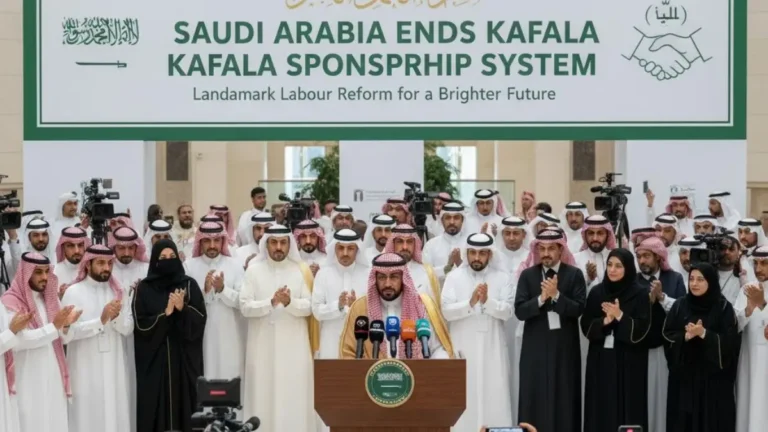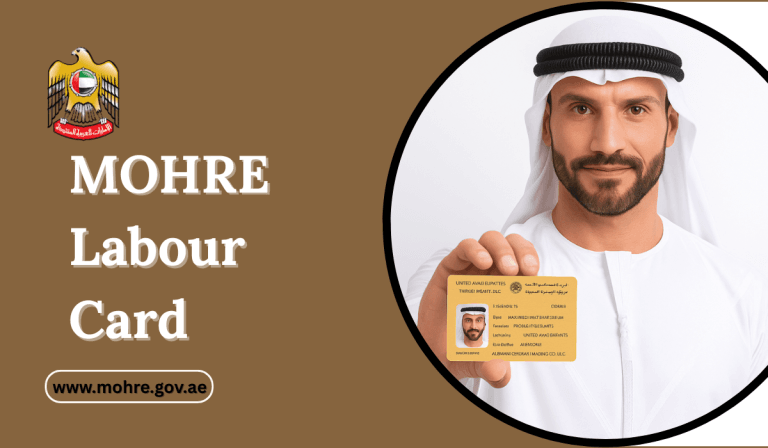
The United Arab Emirates has introduced a groundbreaking alternative to the traditional end-of-service gratuity system through the Voluntary Savings Scheme. Announced by the Ministry of Human Resources and Emiratization (MOHRE), this innovative program allows private sector companies to invest employees’ end-of-service benefits in approved investment funds, potentially yielding higher returns than the conventional gratuity system.
This comprehensive guide explains how the new scheme works, highlights its benefits for both employers and employees, and provides practical information on implementation and participation.
Table of Contents
What is the UAE Voluntary Savings Scheme?
The Voluntary Savings Scheme is an alternative end-of-service benefit system that transforms the traditional lump-sum gratuity payment into an investment opportunity. Under this scheme, employers make regular contributions to approved investment funds, allowing employees’ end-of-service benefits to grow over time through investment returns.
As of April 2025, MOHRE has approved four investment funds for participation in the scheme:
- FAB Fund (First Abu Dhabi Bank)
- Lunate Fund
- The National Bonds Sukuk Fund
These funds have been specifically selected to provide secure, flexible investment options while helping companies effectively manage employee savings.
Key Benefits for Employers
MOHRE’s Labour Market Magazine has outlined 12 significant advantages of the Voluntary Savings Scheme. Here are the primary benefits for employers:
1. Enhanced Corporate Reputation
Companies participating in the scheme position themselves as progressive, employee-focused organizations that prioritize financial security and future planning for their workforce.
2. Improved Talent Attraction and Retention
The scheme serves as a valuable recruitment and retention tool, helping companies attract top talent in a competitive job market by offering enhanced end-of-service benefits.
3. Cost Efficiency
In the medium term, the cost to employers can be lower compared to traditional gratuity payments. This is because contributions are based on the employee’s basic salary at the time of payment rather than at termination when salaries are typically higher.
4. Reduced Financial Liability
The scheme helps companies manage their financial liabilities more effectively by distributing end-of-service benefit funding over time rather than facing large lump-sum payments when employees leave.
5. Increased Employee Productivity and Loyalty
Employees with secure financial futures tend to demonstrate higher productivity and stronger loyalty to their employers, creating a more stable and effective workforce.
6. Enhanced Business Resilience
By systematically funding end-of-service benefits, companies build greater financial resilience during economic challenges or business downturns.
Benefits for Employees
The Voluntary Savings Scheme offers numerous advantages for workers in the UAE:
1. Growth of Assets
Unlike traditional gratuity payments that remain static, the scheme allows employees’ end-of-service benefits to grow through investment returns.
2. Financial Security
The system guarantees gratuity payouts regardless of an employer’s financial situation, providing greater security for employees and their families.
3. Optional Additional Contributions
Employees can make additional voluntary contributions of up to 25% of their total annual salary to further grow their investments.
4. Investment Flexibility
Skilled workers can select from various investment portfolios based on their risk tolerance and financial goals, while non-skilled workers are automatically placed in capital-guaranteed portfolios for protection.
5. Investment Continuity
Employees can maintain their investments even after leaving their employer, allowing continuous growth of their savings.
6. Partial Withdrawals
The scheme permits partial or full withdrawals of voluntary contributions and returns according to the terms and conditions.
How the Scheme Works
Enrollment Process
- Private sector companies register for the Voluntary Savings Scheme through MOHRE
- Companies select one of the approved investment funds
- Employers begin making regular contributions based on employee basic salaries
Calculating Benefits
For employees whose companies join the scheme:
- Service periods prior to enrollment: End-of-service entitlements are calculated according to traditional labor law formulas
- Service periods after enrollment: Benefits accrue under the new savings system
- All accumulated benefits (both pre- and post-enrollment) are paid out when employment ends
Expanded Eligibility
MOHRE has expanded participation in the Voluntary Savings Scheme to include:
- Self-employed individuals and freelance permit holders
- Non-UAE nationals working in government entities, institutions, and affiliated companies
- UAE nationals employed in both public and private sectors
Note: Employers must continue making mandatory contributions on behalf of UAE nationals to relevant pension and social security schemes as required by law.
Accessing Benefits
When an employee leaves a company participating in the scheme, they have two options:
- Withdraw their savings from the fund as a lump sum
- Keep the funds invested to continue growing their savings
If moving to a new employer, the employee’s new company may:
- Continue contributions to the same fund
- Choose a different fund manager for ongoing contributions
Disbursement Process
To initiate the disbursement of legal entitlements:
- The employer must formally terminate the employment relationship by canceling the employee’s work permit through MOHRE
- The employee then decides whether to withdraw their savings or continue the investment without making additional contributions
- Voluntary contributions can be withdrawn at any time upon request through the designated administrative service provider
See our detailed guide on end-of-service benefit calculations
Traditional Gratuity vs. Voluntary Savings Scheme
| Feature | Traditional Gratuity | Voluntary Savings Scheme |
|---|---|---|
| Payment Structure | Lump sum at employment end | Regular contributions to investment funds |
| Growth Potential | None – fixed calculation | Investment returns compound over time |
| Calculation Base | Final basic salary | Basic salary at time of each contribution |
| Financial Security | Dependent on employer’s financial health | Secured in regulated investment funds |
| Additional Contributions | Not possible | Employees can contribute up to 25% of annual salary |
| Management Control | Employer controlled | Regulated fund management with employee options |
| Early Access | Not available | Partial withdrawals possible for voluntary contributions |
Using the UAE Gratuity Calculator
To better understand your potential end-of-service benefits under both systems, you can use our UAE Gratuity Calculator. This tool allows you to compare potential outcomes between the traditional system and the new Voluntary Savings Scheme.
Implementation Timeline and Requirements
The Voluntary Savings Scheme is currently available for immediate participation. Companies wishing to enroll should:
- Review their existing end-of-service benefit obligations
- Evaluate the approved investment funds
- Develop a transition plan for existing employees
- Update employment contracts and policies to reflect the new system
- Register with MOHRE and the selected fund administrator
Frequently Asked Questions: Voluntary Savings Scheme
Is participation in the Voluntary Savings Scheme mandatory?
No, participation is voluntary for private sector companies. Companies can choose to continue with the traditional end-of-service gratuity system or switch to the new scheme.
How are existing end-of-service benefits handled when a company joins the scheme?
For existing employees, gratuity entitlements earned before enrollment are calculated according to traditional labor law. From the enrollment date forward, benefits accrue under the new system. All accumulated benefits are paid out when employment ends.
Can employees opt out if their employer chooses to participate?
No, this is an employer-level decision. If a company enrolls in the scheme, all eligible employees will automatically participate.
What happens to employee investments if a company goes bankrupt?
Employee investments are held in regulated third-party funds and are not affected by an employer’s financial situation, offering greater security than traditional gratuity payments.
Are part-time workers eligible for the Voluntary Savings Scheme?
Yes, part-time workers are eligible for end-of-service benefits proportional to their working hours, and these can be enrolled in the scheme. Learn more about part-time worker gratuity entitlements.
How are investment returns taxed?
The UAE does not currently impose income tax on investment returns, making this an advantageous environment for growing end-of-service savings.
Can expatriate workers access their funds if they leave the UAE permanently?
Yes, when employment in the UAE ends, expatriate workers can withdraw their full entitlements from the scheme regardless of their future location.
How safe are the approved investment funds?
The four approved funds are regulated financial products managed by established institutions. They offer varying levels of risk/return profiles, with capital-guaranteed options available for those seeking maximum security.
Can employers change their selected fund after enrollment?
Yes, employers can switch between approved funds, but this typically involves a defined process and notification period.
How does the scheme affect unlimited-term contracts versus fixed-term contracts?
The scheme applies equally to both contract types. Contributions are calculated based on the employee’s basic salary regardless of contract type.
Legal Framework and Compliance
The Voluntary Savings Scheme operates within the framework of UAE Labor Law and is overseen by MOHRE. Companies participating in the scheme must:
- Maintain accurate records of all contributions
- Provide regular statements to employees
- Ensure timely and accurate contributions
- Comply with fund-specific regulations
- Meet all reporting requirements
For comprehensive information on UAE labor law compliance, visit the MOHRE official website.
Conclusion
The UAE’s Voluntary Savings Scheme represents a significant evolution in end-of-service benefits, offering advantages for both employers and employees. By transforming static gratuity payments into growing investments, the system enhances financial security while providing more flexible options for workers.
For private sector companies, the scheme presents an opportunity to strengthen their employer brand, improve talent management, and potentially reduce long-term liabilities. For employees, it offers the chance to build greater financial security through investment returns while maintaining the protection of guaranteed end-of-service benefits.
As the program continues to develop, staying informed about options, requirements, and best practices will help both employers and employees maximize the benefits of this innovative approach to end-of-service compensation.
Disclaimer: This article is intended for informational purposes only and does not constitute legal advice. For specific guidance regarding the Voluntary Savings Scheme or end-of-service benefits, please consult with a qualified legal professional or contact MOHRE directly.





